MEPs Urge Agriculture Minister to Stop Illegal Captivity of Bears in Croatia
ZAGREB, February 21, 2020 - Fifteen members of the European Parliament Intergroup on the Welfare and Conservation of Animals have appealed in a letter to Croatian Agriculture Minister Marija Vučković to ensure that Croatia implements the Animal Protection Act and puts an end to illegal captivity of brown bears.
The Croatian association Friends of Animals said on Friday that the Dutch MEP and chairwoman of the intergroup, Anja Hazekamp recalled in the letter to Minister Vučković that in October 2017 Croatia adopted the Animal Protection Act which bans holding and showing bears outside registered zoological parks and shelters, which included a transition period until 31 December 2018, warning however that bears continue to be illegally held in captivity in Croatia.
Two brown bears are still being held captive as a tourist attraction at the Macola restaurant in Korenica, on the road to the Adriatic coast, in a pound that is not registered either as a zoological park or as an animal shelter, which constitutes illegal captivity under the law and the relevant authorities have not ordered their confiscation.
In addition to the two bears in Korenica, another bear is being kept by a family in Rušćica.
The Croatian association supported the MEPs and called for the immediate relocation of the bears to be shelters.
The MEPs also warned of the need to protect other wildlife, including big cats.
More news about animals in Croatia can be found in the Lifestyle section.
Plenković Trying to Make Sure That MFF Is Favourable to Croatia
ZAGREB, February 21, 2020 - Prime Minister Andrej Plenković would not say on Friday morning whether the ongoing EU summit would result in a compromise on the 2021-2027 Multiannual Financial Framework (MFF).
The extraordinary summit, which began on Thursday afternoon in Brussels, continued for several hours until late Thursday evening and resumed on Friday morning.
On Thursday afternoon, European Council President Charles Michel held a series of bilateral meetings with heads of state or government of the 27 EU member states.
Commenting on his talks with Michel, Plenković said that he had highlighted the matters important for Croatia, such as cohesion policy and demographic revitalisation.
"We have tried to see to it that the final agreement brings about as good results as possible for Croatia" Plenković said.
Danish Prime Minister Mette Frederiksen, whose country is among those calling for cuts to the EU budget, said on Friday morning she did not believe EU member states would reach an agreement on the 2021-2027 Multiannual Financial Framework (MFF) this weekend.
We are still negotiating. Our position is clear. I am prepared to stay the whole weekend, but it is likely that a new extraordinary summit will be needed, Frederiksen said ahead of the second day of the extraordinary summit on the MFF. She added that she was not sure when the next summit could be convened.
Denmark, Austria, Sweden and The Netherlands, dubbed the frugal four, insist that allocations to the new EU budget should not exceed one percent of the Gross National Income.
More news about Croatia and EU funds can be found in the Politics section.
Croatia's Annual Inflation Reaches 2.0% in January
ZAGREB, February 21, 2020 - Croatia's annual inflation rate, as measured by the consumer price index, was 2.0% in January 2020, the National Bureau of Statistics (DZS) said on Friday.
The annual rise in consumer prices was mostly driven by the rise in transport prices (+4.9%), on the back of the rise in prices of fuels and lubricants for passenger vehicles (+9.8%). This was the result of a considerable drop in prices of Brent crude oil at the end of 2018, analysts at Raiffeisen bank (RBA) said.
Compared with January 2019, prices of food and soft drinks increased by 3.4%, with prices of meat going up by 8.6% and those of fruit by 11.7%. Prices of housing, water, electricity and gas were 1.6% higher and those of hotel and restaurant services were up 2.7%.
Year on year, consumer prices rose, albeit at a slower rate, in all other categories except recreation and culture, which recorded a decrease of 0.4%.
Excluding energy, consumer prices increased by 1.6% overall, and without energy and food, they were 0.7% higher.
Compared with December 2019, consumer prices fell by 0.3% on average.
More economy news can be found in the Business section.
World Rally Championship Coming to Zagreb? Croatia Given Green Light
February 21, 2020 - The director of the World Rally Championship (WRC), Oliver Ciesla, visited Zagreb and officially offered Croatia the host spot of the WRC, according to the Croatian Auto and Karting Association.
HRTurizam and 24 Sata report that Croatia has never been closer to hosting the second most-watched octane sport in the world. WRC leader Oliver Ciesla held a series of meetings in Zagreb with the President and Secretary-General of the Croatian Auto and Karting Association, the City of Zagreb, and potential organizers. October was proposed as a potential date for the race, and Zagreb was given the opportunity to host the World Rally this year. The City of Zagreb supports the project and expressed its wish for Zagreb to host an event that boasts over 80 million fans.
"We plan to get the nomination, and if all goes well by the end of the year, all the doors are open to Croatia to become part of the Rally World Championship in the future,” said Oliver Ciesla, WRC director.
"After seven years of talks about hosting the WRC in Croatia, we have an official offer, after which the WRC's door opens. The importance of this event for Croatia is also supported by the Croatian Government, the City of Zagreb and other institutions. I hope that in the next ten days, the expert teams will conclude all the essentials for the end of the year to become a candidate. Thanks to the Mayor, our organizing team, and, of course, the WRC promoter for the offer. There are a lot of negotiations ahead, but we are on the right track,” said Davorin Štetner, president of the Croatian Auto and Karting Association
The story of the WRC in Croatia began by Croatia’s celebrated rally drivers Daniel Saškin and Marin Frčko, and after almost seven years of work on the project, this official offer is the result.
The World Rally Championship is monitored by more than 700 million viewers annually, of which four million viewers tracked the 13 WRC races in 2016, while the World Rally Championship is monitored by 1350 accredited journalists, producing over 12,000 TV hours. The WRC program is broadcast in 155 countries.
Profitability studies from 2018 prepared by the Faculty of Economics and Tourism from Pula, led by Robert Zenzerović, the Ethical Financing Cooperative from Zagreb, and a short study by the Department of Economics and Sport Management at the Faculty of Kinesiology in Zagreb, led by Sanela Škorić et al. Mat Bartoluci from the Faculty of Economics and Business, Zagreb, and data from other WRC races in the world, proves that this project is of great benefit to the Republic of Croatia.
In the most conservative calculations, the spending generated would be 22 million euro. The direct profit for the state, through VAT alone, is at least four million euro, while the indirect profit of the project through media is a considerable 41 million euro.
Official WRC data in Portugal for 2016 show that 910,000 viewers watched the WRC live stream (50% were foreigners; half of them were from neighboring Spain). The direct impact on the Portuguese economy amounted to a staggering 67.6 million euro, while the indirect profit amounted to 61.7 million euro. In regards to tourism, Portugal earns more than 1.5 million overnights a year from WRC alone!
The WRC would be a great promotion of Croatia and another global spectacle held in the country.
To read more about sport in Croatia, follow TCN's dedicated page.
EYCS Council Adopts Resolution on Education and Training
ZAGREB, February 21, 2020 - Croatian Science and Education Minister Blaženka Divjak in Brussels on Thursday chaired a meeting of the European Union's Education, Youth, Culture and Sports Council, which adopted a resolution on education and training and held a public debate on brain circulation.
The resolution on education and training calls for appropriate involvement of education ministers in the European semester process when education and training related issues are being discussed. It reflects member states’ commitment to further improve the quality of education and training.
Education and training are essential for future sustainable growth, competitiveness and employment. As well as responding to the needs of the labour market, quality and inclusive education and training enable personal fulfilment, social cohesion and inclusive societies, the resolution says.
"Without a quality education there is no sustainable development, and investment in education is investment in our future," Divjak said ahead of the Council meeting.
Speaking of the debate on brain circulation, she said that "Croatia's plan was to include a debate on the agenda on how to achieve more balanced mobility in the EU, because talents are evenly distributed, but opportunities are not. Our task is to give equal opportunities to all countries and all regions."
Divjak said it was necessary to ensure synergies between different policies and use different investment opportunities to create favourable conditions to attract and keep talent.
More education news can be found in the Lifestyle section.
Conference on Fascism and Anti-Fascism Condemns Rise of Extreme Right
ZAGREB, February 21, 2020 - Participants in a two-day conference on fascism and anti-fascism in present-day Europe, which started in Zagreb on Thursday, condemned the strengthening of extreme right politics and cases of undermining democratic values in Europe.
Addressing the event, which brought together some 50 participants from 15 European Union member states and a some countries in Croatia's neighbourhood, the leader of the SABA RH antifascist association in Croatia, Franjo Habulin, said that the re-emergence of fascism is being seen and systematic attempts to subjugate the values of anti-fascism, under the pretext of stepping-up condemnation of communism and equating Communism and Fascism.
Habulin insists that it was the Communists who played significant roles in many movements of resistance, and praised Communists in Yugoslavia for launching the movement of resistance and for ensuring its victory.
He also said that the fact that Communism is "an ideology and mindset that was never realised in the world" was being incessantly ignored.
Habulin criticised the media, education system and religious communities for downplaying the criminal character of Fascism, with the tacit approval "from some democratic governments and with the active participation of the EU."
At the start of the conference, the International Federation of Resistance Fighters the acronym of which is FIR presented its statement in which it condemns the Hanau massacre in which a 43-year-old extremist killed at least nine people as well as his own mother and then committed suicide in that German town near Frankfurt.
The FIR association extended its condolences to the families of the victims and urged politicians, NGOs, activists and anti-fascists associations to send an unequivocal message that racist violence should be prohibited.
On Friday, the second day of the conference, participants in the event are expected to adopt a declaration.
The organisers of the Zagreb conference invited representatives of anti-fascist associations from 25 European countries, including 15 EU member-states to attend the conference.
More politics news can be found in the dedicated section.
Number of Counterfeit Euro Notes in Croatia Up 14 Times
ZAGREB, February 21, 2020 - A total of 228 counterfeit kuna banknotes were withdrawn from circulation in the second half of 2019, a 3.4% decrease compared with the same period in 2018, while the number of counterfeit euro notes increased by more than 14 times to over 4,000, the Croatian National Bank (HNB) said on Thursday.
Between July and December 2019, 4,056 counterfeit euro notes were withdrawn from circulation in Croatia, which is an increase of 1,323.2% compared with the same period in 2018 when 285 such notes were removed from circulation, the central bank said.
The majority of counterfeit banknotes, 3,771 or 93%, were 500-euro notes.
A total of 4,341 counterfeit banknotes of all currencies were registered in the second half of 2019, an increase of 608.2% over the same period in 2018.
"Despite a higher nominal value of registered counterfeit euro banknotes, counterfeits registered in the second half of 2019, as regards their quantity and production quality, did not cause any disturbances in cash operations, neither in specialised institutions nor among the general public," the central bank says.
More economy news can be found in the Business section.
Why Does Nobody Get Married in Sibenik in the Romantic Month of May?
February 22, 2020 - It is one of the most romantic months for weddings, so why does almost nobody in Sibenik get married in May?
Whether we like weddings or not, the ones held in May are beautiful. Fabulous weather, fancy light clothes. Not too cold and not hot, but simply just right. Everything usually comes together perfectly in a May wedding. So why do they hardly exist in Šibenik?
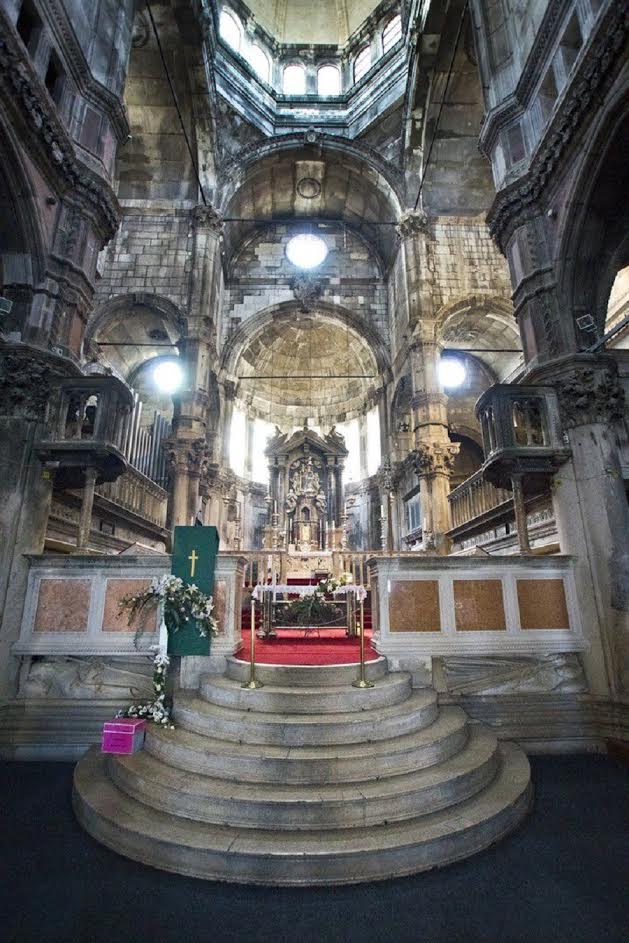
For as long as I can remember, my mother has always told me that there is no wedding held in May in Šibenik. Then I would ask her why, and she would simply tell what they told her it is a bit of bad luck to marry in May. It brings unhappiness, health problems, family feuds, simply bad luck. Throughout the generations, parents and grandparents have told their children about the golden rule - not to marry in May. Only some people say it is some legend that people told them and others simply shrug it off saying they told me so, so I am sticking with it.
So the story takes us back to 1647 when the plague was big in Šibenik. The plague probably came to Šibenik due trade relations on the Adriatic between countries and because of the Kandyan war. Before the plague, Šibenik was the most populated town in Dalmatia. But because of the plague, Šibenik lost eighty per cent of its population. Only ten out of 150 noble families survived. But behind the plague, there is also a legend. The citizens of Šibenik believed in vampires and witches back then, and they thought that one dead man was a vampire. Apparently, he would wake up at night and get out of the coffin and kill other people. One night a few „brave“ people came to the city cemetery, opened the coffin and they were ready to put a stake through his heart. But that is not the end of the story. Having opened the coffin, the citizens awoke the plague in the town. The wider population got sick and they died.
And there is also a legend to the story, which explains the cursed marriage if you get married in May. The story starts with a young noblewoman who helped the sick people with the plague. The noblewoman was in love with a poor man from the surrounding area. She was a great woman with a big heart and she wanted to help her citizens. So she went to the cathedral and promised and gave a vow to God that if he stopped the plague, she would become a nun. She wanted to save the few people that were left living in Šibenik. In the end, she did that. She gave up on her love for the people of Šibenik. In May she went to the monastery of St. Luce.
In the end, she didn't stay as a nun. The plague in town was healed, but her heart wasn't. She talked to the head nun, and the nun as a woman of understanding, released her from her obligation. Some people believe that it is bad luck to get married in May, but most people don't get married in May out of respect for a noble girl, who gave up on her love and happiness for Šibenik. Some people stick to the tradition nowadays, saying it is bad luck I don't want to risk it. Others say that it is a stupid tradition in which is stupid to believe. They say it is stupid to believe in superstitions and that May weddings are the most beautiful.
A local portal showed us that there were just eleven marriages in 2019 in May held in a church or city hall. In 2018 there were eight weddings and in 2017 eleven as well in 2019. The year 2016 holds the record, having fifteen marriages, who ignored superstitions and enjoyed the most important day in their lives in front of the family and friends.
Even if that information shows that there is progress in having a May wedding, some are just believing in tradition and customs that their family gave them. It will be a long time until you hear the regular ringing of wedding bells in May. But there is not only the legend and superstitions but the love for the town and sacrifice which young woman gave. So mostly due to that respect, people do not get married in May.
Want to know more about Šibenik? Here are 25 things to know.
Creative Young Croatian Returnees: Uniting Artists & Business to 'Fill the Void' with Culture
February 21, 2020 - Winter life on the Dalmatian coast is a fraction of its summer energy. But not everyone is hibernating, and indeed some are finding very creative ways to fill the void.
Last night, I entered a souvenir shop to find a performing artist was crouching inside a Coca Cola fridge. When not in a fridge in a closed shop on the usually empty-all-winter Zadarska Ulica, Mia Kevo is dancing. Of late, Mia runs choreographed and improvised dance programs for people with disabilities around Croatia. This is one of many local and international artists - including photographers, filmmakers, urbanism researchers, who are part of the program for Culture Hub Croatia’s (CHC) PRAZNINE 2020 - an international artist program, loosely translating to VOIDS 2020. The program makes use of spaces which sit empty in winter due to unsustainable tourism practices - and is sign youth who are gaining expertise outside, are taking steps to change things in their hometowns - and in general, being supported by local businesses who see the need to re-energise coastal cities.
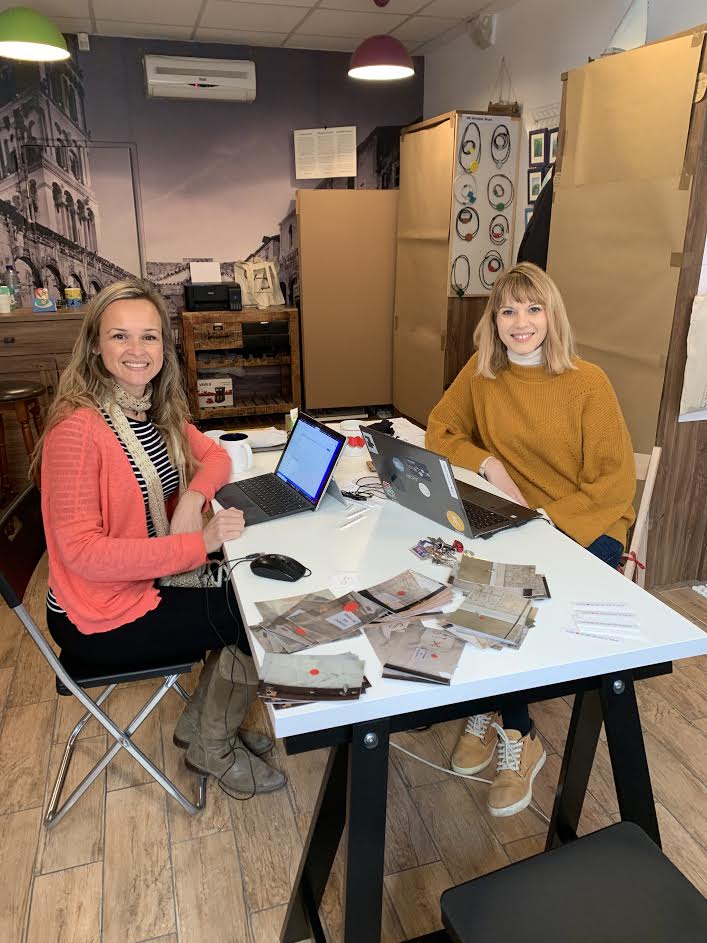
I’m writing this sitting in a pop up coworking space on Bosanska 4 in Split with one of the CHC founders, Marina Batinic, originally from Split and based between her hometown and Brussels. In the summer, this pop up cowork space functions as a souvenir shop - across the Game of Thrones Museum. The owner, Sanja, opened her doors and supports the space for artists initiative. Like so many, hers is a business reliant upon crowds - who disappear by around 1 November. I’m surrounded by handmade items from Dalmatia - from jewelry, paintings, sculptures and behind a brown box a sign for ‘magical bottles’. I’ll have to come back in the Summer to peruse the items for sale. These are the kind of sustainably-minded thinking businesses to support. (Looking out the window, I note even the GoT museum is boarded up). Marina is part of the culture hub trio, also included Jasmina Šarić and Kristina Tešija - all who are making a commitment to bringing international, cultural initiatives to their hometown, operating based on citizen support.
Sitting here with Marina, we discuss the changes we’d like to see and the challenges each of us has encountered - from local mindset, to tiring after swimming against a wave bigger than just a few people. Personally, being a champion for Remote Working and digital nomads (for which this country is an ideal destination) conversations like this are common - if only with a small handful of those ‘taking things into their own hands’. Sometimes, it’s like an inner tennis match going on, when you think about the number of people leaving - and yet, the number interested in coming. So why aren’t these people coming back?
Infrastructure.
A lack of faith in a system they left.
Easier (perhaps) living on greener pastures. But is it, really?
In the last month alone, I have a renewed optimism, from reading and speaking to members of the upcoming Day One tourism conference, and people - with established careers outside of Croatia, choosing Croatia or coming back - coming back due to the need for role models and mentors. In the words of Mate, one such accomplished gentleman among them, “if I don’t who will?” Thank you, Mate. Are there more like you?
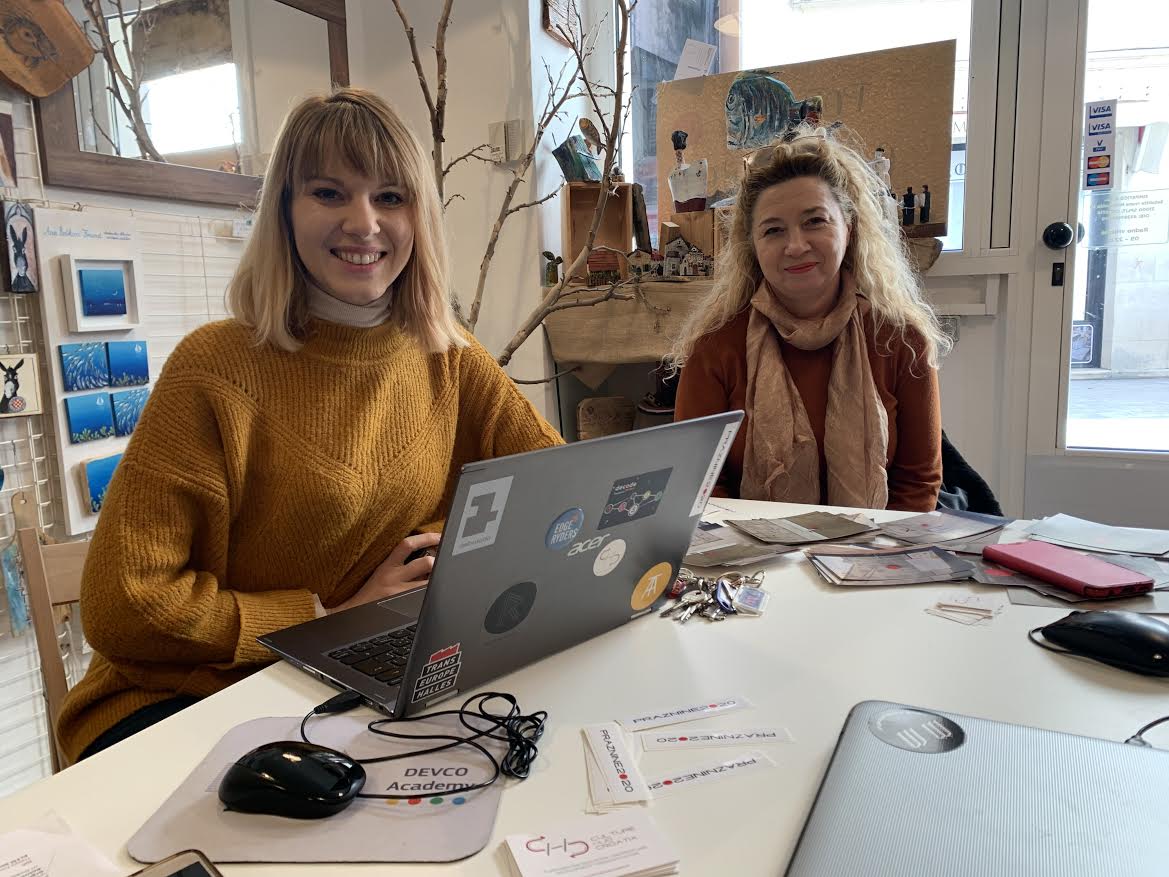
To return to the program, which does more than show this is an ideal, if under-utilised place for activity in the off-season, Marina shared more about the motivation and thinking behind PRAZNINE 2020.
“We invited artists from the region because the aim was to bring their artistic production more closer to the people. We’re not used to seeing contemporary art production at all and we don’t really collaborate in the region. We wanted to use arts to facilitate this dialogue and understanding. We have artists from North Macedonia, Albania, Kosovo and Bosnia. We want to meet these people and understand their work.
This is why we chose to have ‘open studios’ - even people who don’t understand contemporary art - to make people interact.
These Balkan countries need more dialogue. We wanted to use art as a means [for this].”
CHC are part of a wider international network, and now bringing their international connections to their hometown.
“We didn't want to limit the program only to the arts and open studios but we opened our calendar to the local community and other civil society organisations who were able to make their proposals for events and organize them in one of these spaces. In this way we allow everyone to shape their own city and gain back the ownership over it.”
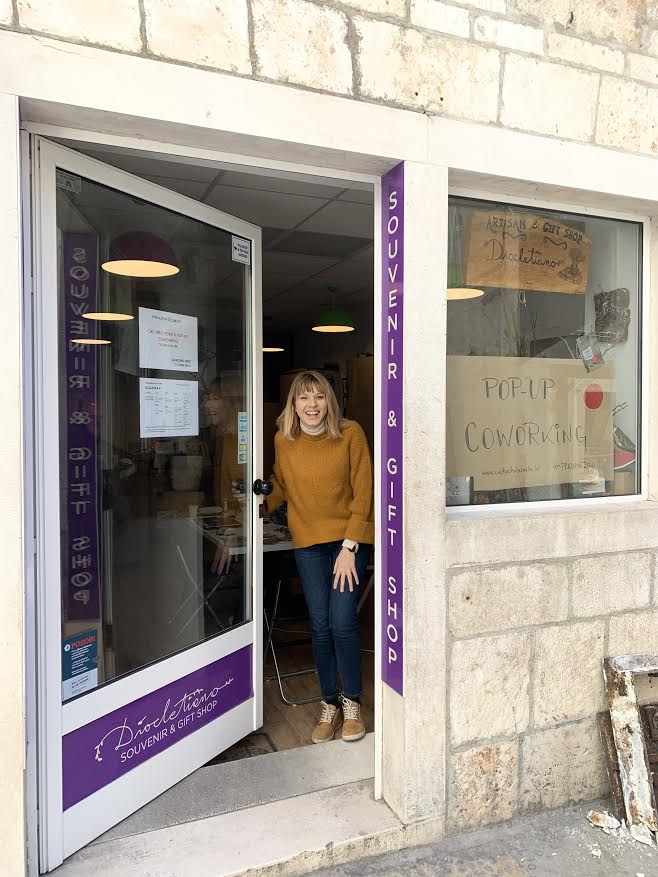
Sitting here, our joint guesstimate 60 to 70 per cent of the Split palace and the surrounding area is empty over winter. In setting up for their event, 35 promotional red dot stickers were printed - to be placed on empty “boarded up” businesses. They were used up in a matter of minutes.
For the finalé event, representatives from the European Creative Hubs Network (EHCN), Luka Piskoric from Poligon Ljubljana and Istanbul’s Atölye’s Atılım Şahin are coming. It is a great opportunity to see what is happening with Creative Hubs in the region on a wider scale.
--
WORTH RETURNING? IF ONLY THE “VOID” SEASON
In an era which is increasingly enabling and empowering remote work and digital nomadism - why isn’t the mini-Croatia in Dublin and the like thinking about basing here? If only during the “off-season”. It sure is sunnier. And with making use of empty spaces - all CHC had to do was knock on the door and ask (how novel). CHC prove it is possible.
Initiatives like these - a pilot project in the eyes of CHC, but hopefully an enduring one - are bringing life back. It no longer needs to be a smoky cafe and people futilely talking about politics when (if) you return. It’s connection with a cultured hit.
It seems there could be. As we sat at Marulus Bar last night - and had this unique stone-walled bar (with smoke free zone) entirely to ourselves - Marina shared stories of the large number of people reaching out to CHC from outside of Split (its official base) and applauding them for their efforts. I had the pleasure of doing it in person. In one of countless cities ripe for cultural and digital nomad disruption.
PRAZNINE 2020 is filling the void you may be experiencing this Winter, and runs until 7th March 2020. To see the full calendar and full event descriptions, and bios of the artists (in English and Croatian, visit the page on Culture Hub Croatia’s website or the Facebook event page.
Want to know more about being a digital nomad in Croatia? Follow the dedicated TCN section.
PHOTO: 6th-Century Sarcophagus in Trogir Contains Message for 21st-Century Citizens
February 21, 2020 - A recently discovered 6th-century sarcophagus in Trogir has a message for citizens of the 21st-century.
Dalmacija Danas reports that a stone sarcophagus arrived at the Trogir City Museum this week, which was discovered by archaeologists from the company Temenos d.o.o when exploring several late antique graves and tombs on Put Ribola.
The ancient attraction, however, was mistaken for a garbage bin my many passersby on Wednesday, prompting clever signage that honors the antiquity of the stone coffin.
Namely, popular satirical Facebook page ‘Daily dose of the average Dalmatian' posted a photo of the sarcophagus with a message to citizens.
“I am not a bin for garbage but a sarcophagus from the 6th century!”
The comments, as expected, are entertaining as ever.
“And not just any 6th-century sarcophagus. I am a sarcophagus who knows how to write, print and paste this message to you, an evil man of the 21st century!”
“Typical Dalmatian, we have been using the same bin for millennia and a half!
“Great to see how we treat our historical heritage! What is that sarcophagus doing in a street where everyone can throw garbage in it!? Isn't this intended for a museum or other institution? What a shame."
This sarcophagus is a representative of the geometric style characteristic of the 6th-century sarcophagi that were produced in Brac-Salona workshops, which were popular not only in central Dalmatia but were exported throughout the eastern Adriatic coast as well as Italy. It is a tomb of the better-known late antique Trogir, in which two deceased were buried, which we will know more about after the anthropological analysis of the remains.
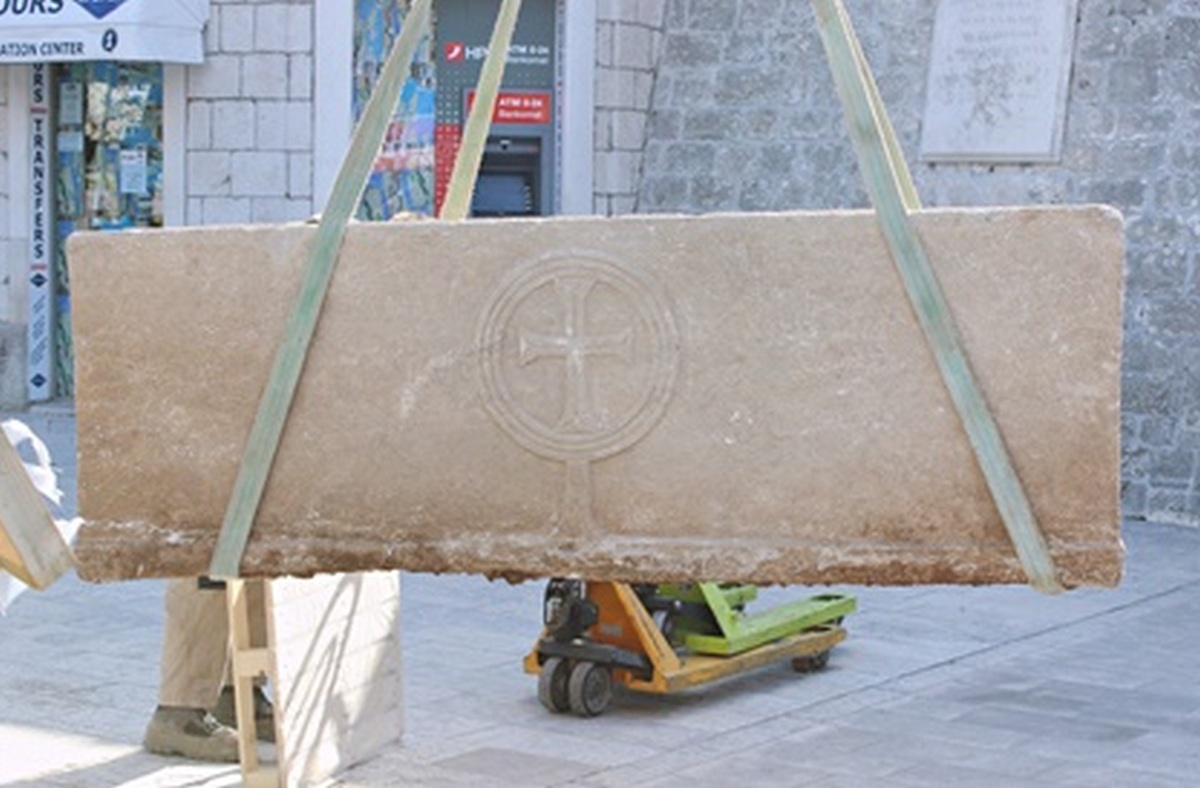
Trogir City Museum
The cemetery's findings indicate the existence of a larger economic-country complex (villa rustica) in the area of Ribola in the late antique period (4th - 7th centuries), where a church was erected in the Middle Ages, as evidenced by the map of Trogir from 1828, whose name so far, has not been revealed.
It is worth noting that P. Andreis mentions as many as four churches in the Red Land (Ribola) area, with the ruins still visible today.
To read more about lifestyle in Croatia, follow TCN’s dedicated page.

